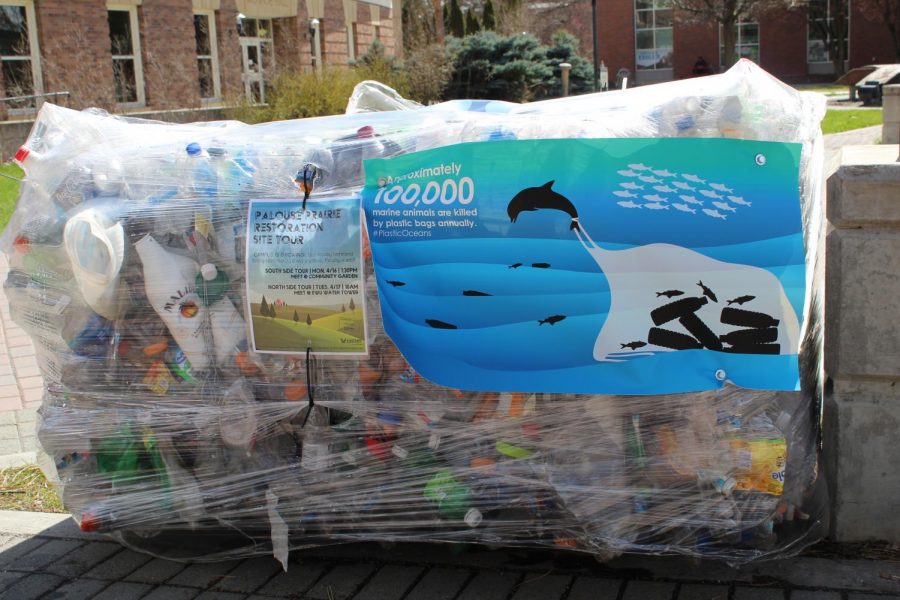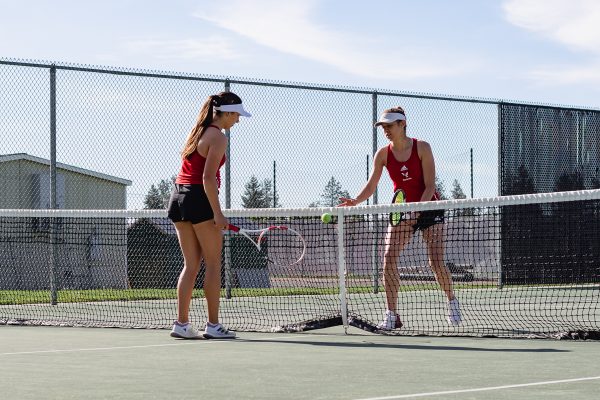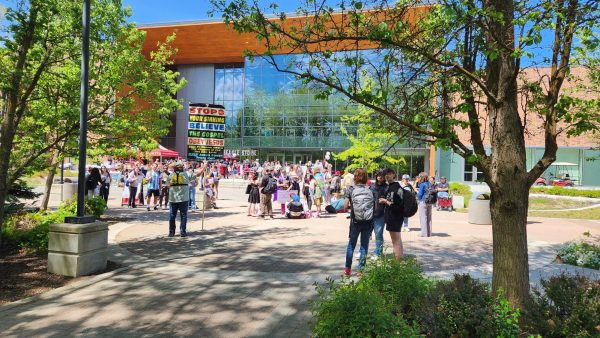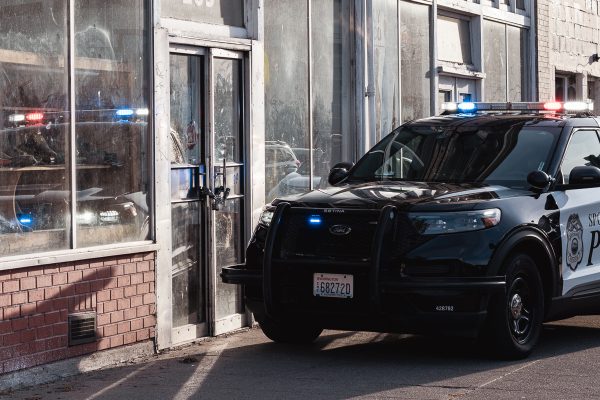How To Make A Difference On Earth Day and Every Day
April 18, 2018
Students and community members will join forces to pick up litter and bring awareness to the planet’s growing pollution problem throughout April.
From film festivals to volunteer events, all students can find an opportunity to celebrate, advocate and work for a cleaner planet in the upcoming weeks surrounding Earth Day. But efforts to make the earth a better place don’t have to stop there. Earth Day’s 2018 theme is “End Plastic Pollution,” and as individuals, we don’t have to change much in our daily lives to help contribute to this goal.
“Earth Day should be everyday,” EWU sustainability coordinator Erik Budsberg said. “There’s little things you can take steps for that don’t cost you any money. The simplest thing you can do is carry that reusable bottle. Don’t use straws.”
As humans, we collectively produce nearly 300 million tons of plastic every year, half of which is for single use, and 8 million tons of which is dumped into the ocean yearly.
“That’s just really relevant as we get better information on plastics and how it’s breaking down in the ocean and how it gets into the food chain,” said Budsberg. “I think it’s important to be aware that plastic doesn’t really break down; it’s gotta go somewhere.”
Since the 1990s, water bottle sales and waste have both been on the rise, while the amount of bottles recycled has stayed fairly consistent, according to container-recycling.org. The U.S. has fallen behind in using responsible disposable practices, according to oceanconservancy.org, recycling only 9 percent of its plastic. Furthermore, only 10 percent of that amount is re-recycled. The effect of so much waste has an immense negative impact on the environment, as it can take 450 years for a single plastic bottle to decompose, according to a report published by des.nh.gov.
While as a nation we may have a long way to go in becoming more sustainable, we’re seeing progress in both campus and local efforts. The EWU dining hall is putting a focus on reducing waste.
“The packaging they sell is either recyclable or compostable,” said Budsberg. “Everything has a place here on campus. We have a recycling center on campus and they work really hard to make sure that everything is disposed of properly.”
Additionally, the sustainability club and the alternative energy engineering club are working to get students interested and involved in environmentally-friendly practices. Students can learn more about sustainable practices at the Earth Day Fair on campus on April 19.
The City of Spokane is implementing better practices by replacing all of the trash cans downtown with solar-powered compacting garbage cans that have built-in recycling receptacles this spring. The city advises local businesses to use sustainable packaging as much of it ends up on the street, and they are working to bring awareness to the problem by hosting Spring Clean Week, where individuals and workplaces are encouraged to choose a different emphasis of cleanup each day this week through a photo contest using the hashtag #springclean2018. At the end of the week, the city will organize volunteers in the cleanup of a city block downtown.
Local outdoors groups are doing their part in cleaning up the areas beyond the city streets. The Bower Climbing Coalition is working to increase safety with a goal of rebolting all of the local climbing areas, as many bolts haven’t been replaced since the 1980s.
A lot of what the BCC does while working in climbing areas is trail maintenance and trash cleanup.
Megan Marion, membership coordinator for the BCC, encourages climbers and hikers to do their part in taking care of our local recreation areas.
“Pack it in, pack it out,” said Marion. “I’ll see just the end bits of a rope out there and it’s kind of sad. Just be mindful and considerate. Stay on the trail.”
The BCC, alongside EPIC Adventures and the EWU climbing wall will be hosting a cleanup event on Sunday at all of the local climbing crags. Marion discussed how getting involved in Earth Day is a great way to get people thinking about their role on the planet every day.
“It teaches younger generations and even just current climbers the importance of taking care of the environment we get to enjoy—helping keep areas pristine and helping to reduce our footprint on the environment,” Marion said.
A Brief History of Earth Day:
Earth Day began on April 22, 1970 when 20 million Americans advocated for a sustainable and healthy environment in rallies across the nation. The movement was started by Wisconsin Senator Gaylord Nelson and furthered by Denis Hayes of Harvard University, who built a national staff to promote the events.
These efforts achieved support from both Republicans and Democrats and led to the creation of the U.S. Environmental Protection Agency and the passage of the Clean Air, Clean Water and Endangered Species acts by the end of 1970.
In 1990, Denis Hayes organized another campaign and Earth Day went global, with 200 million people across 141 countries participating in the movement.
Today, Earth Day is the largest secular observance in the world, celebrated by more than one billion people each year, according to earthday.org.
Regarding the celebration of Earth Day, Budsberg said, “It’s important to take a day to celebrate and to recognize what our environment means to us and respect it and be mindful of it.”
Jemma Riedel, EWU AmeriCorps College Access Program Coordinator, who is heading up Saturday’s volunteer event in Cheney, encourages students to take advantage of one of the many volunteer opportunities available to them surrounding Earth Day.
“It’s a good opportunity as students of EWU to give back to the small town that we’re a part of,” Riedel said.






![Simmons said the biggest reasons for her success this year were “God, hard work, and trusting [her] coach and what she has planned.”](https://theeasterner.org/wp-content/uploads/2024/05/image1-1-1200x800.jpg)


![Simmons said the biggest reasons for her success this year were “God, hard work, and trusting [her] coach and what she has planned.”](https://theeasterner.org/wp-content/uploads/2024/05/image1-1-600x400.jpg)






